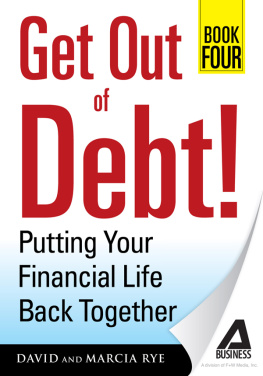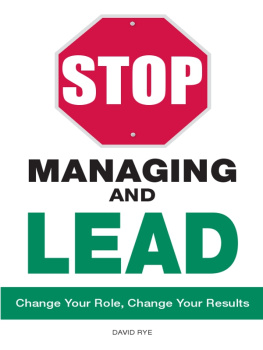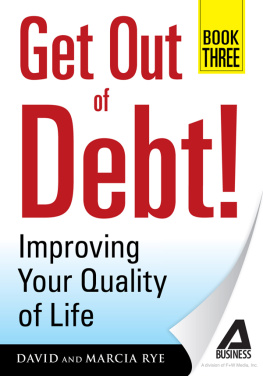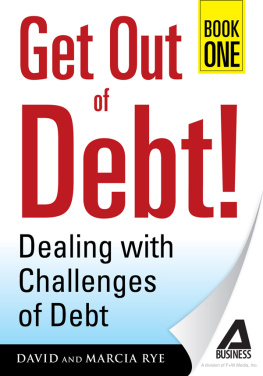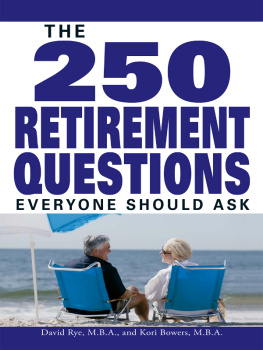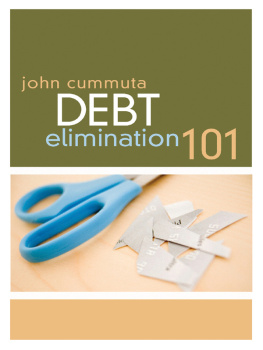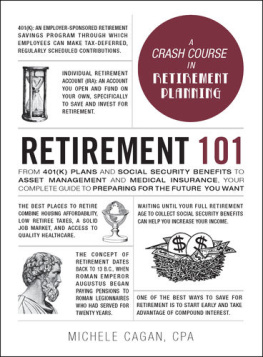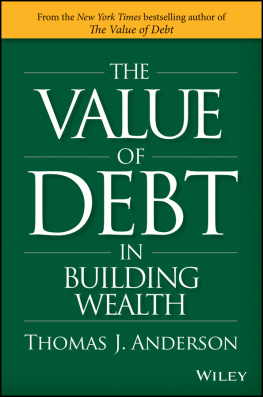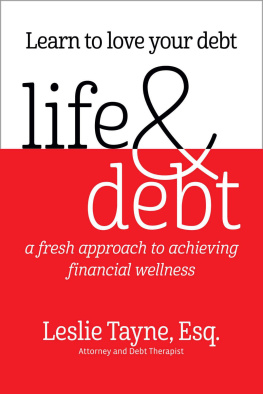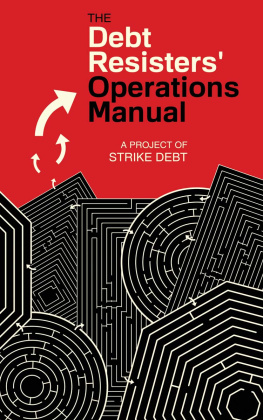Get Out of Debt!
Book Four: Putting Your Financial Life Back Together
DAVID AND MARCIA RYE
A division of F+W Media, Inc.
INTRODUCTION
Do you ever wake up at night worried about the financial setbacks and conflicts that youre having with your creditors? Do you become aggravated over the fact that you never seem to have enough money to live on? What are you going to do to control the confrontations that erupt when you address the subject with family members? What steps can you take to eliminate the financial mess that you are in?
Unfortunately, tens of millions of Americans are in your shoes. Like you, they are headed for financial disaster if they dont figure out a way to get out of debt.
This fourth and final installment of Get Out of Debt! has been written to answer your questions. As you read the material in this book, you will quickly learn how to assess the magnitude of your debt problems so that you can determine where youve been, how you got there, and, more important, where you want to go. When you plunge into these questions about how to avoid debt traps and how to create a realistic spending plan that works for you, you will discover the answers youve been looking for. Youll find out how you can dramatically improve the overall quality of your life once you eliminate your debt load.
The Get Out of Debt! series contains all of the elements you need to consider to get out of debt and improve your financial well-being. Each installment includes a set of questions that builds on what you learned from the previous one. Based upon your own situation, select the installment and questions that cover the subjects that are most important to you. That will allow you to maneuver through your personal debt-related issues and make the right decisions to avoid economic catastrophe. All four installments of Get Out of Debt! are filled with real-world examples and supplemented with detailed heres why it works illustrations.
The sooner you start mounting an assault on your personal debt, the sooner you will see your debt numbers heading down rather than up. When that happens, you will feel great!
Chapter
ASSEMBLING YOUR
FINANCIAL PLAN
A financial plan consolidates into a single plan everything that you have learned and want to do up to this point. All of the notes that youve taken on spending less, consolidating debt, reducing what youre spending on insurance, and the wealth of other debt-related topics that weve covered can be assembled into a binder or file folder so that the material is at your fingertips when you need it. Youll see how to assemble your financial plan in this chapter.
#1. It seems like everything I try to do to getout of debt requires a plan. Why do I need a financialplan?
You need a financial plan because it is your starting point for getting out of debt. In all probability, you did not get into debt overnight. It took time and happened because of a number of financial decisions that you made. Unfortunately, your debt wont just go away with a wish and a prayer. Its going to take planning and hard work to make that happen.
#2. What are the essential components of afinancial plan?
Include a list of specific financial objectives in the front of your plan. For example, it might include a college education for one of your kids, a down payment on a home, or an emergency savings plan. Place dividers in your planning binder for the following sections:
Income Plan: Here is where you show your monthly take-home pay and any sources of additional income that you might have.
Spending Plan: This section includes your monthly budget supplemented with a written spending plan that shows how you will meet specific expense categories and control your expenses.
Saving Plan: What you plan to save each month is shown in your saving plan. Show where the money will come from and how it will be deposited into your savings account(s).
Security Plan: Identify each insurance policy that you have, what is covered, and when the premium payments are due. Include any notes you may have to reduce or increase your insurance premiums.
Tax Plan: Identify the steps that you are planning to take to reduce taxes. Outline the tax deductions that you intend to take and what rate youre in.
Retirement Plan: Contributions that you are making into retirement accounts like IRAs are identified in this section, which will complete your investment plan.
#3. Who can I call on to objectively review myplan before I implement it?
After youve put your financial plan together, you are ready for a critical evaluation of your plan. If you havent documented your plan in writing, complete with spreadsheets that project income and expenses throughout your life, then you dont have a plan thats worth considering. When you are confident that you have a solid plan, have it reviewed by a professional, such as a CPA, accountant, or certified financial planner. Of course, this review will cost you money up-front. However, think about it as a small price to pay to ensure that your plan is solid and tight. Its okay to include contingency plans in your master plan if certain assumptions that you have made dont work out. In fact, if you dont have lots of contingencies built into your plan, you probably dont have a solid plan.
#4. Do I need to have professionals reviewspecific sections of my financial plan after I haveimplemented it?
Yes. If you have a question or need advice on your financial plan, you may want to consult one of the following professionals:
Accountantfor tax advice and tax strategies.
Insurance agentfor insurance coverage issues and policy information.
Stockbroker or mutual fund agentfor investing in stocks and bonds. They can also provide you with information pertaining to money market funds.
Bankerfor information on savings and certificate of deposit accounts.
Financial plannerfor general advice on finances including the spending, saving, insurance, and investment sections of your financial plan.
#5. What exactly is a financial planner?
A good financial planner is a one-stop money consultant. They in theory know a little something about everything in the financial planning field. They can help you uncover the problems that caused your past debt, help you formulate new financial goals, and develop an implementation plan. They can also help you merge your savings into an investment plan. A majority of planners make their living selling insurance policies, tax-deferred annuities, mutual funds, stocks, and their consultation time. Many financial planners do tax returns.
#6. How do I find a good financial planner?
You can obtain a directory of the financial planners who are in your area by contacting (1) The National Association of Personal Financial Advisors (800-555-6659 or www.napfa.org), (2) The American Institute of Certified Public Accountants Personal Financial Division (800-862-4272 or http://pfp.aicpa.org/resources), or (3) The Financial Planning Association (800-282-7526 or www.fpanet.org). When you begin to make your initial screening calls for a planner, let them know as specifically as you can why youre seeking help and ask them what services they offer. Listen carefully to their answers to help you determine if they have the expertise you need. Ask them for the names of at least three clients whom you can contact who have been with them for at least two years, and make sure you contact these clients to determine their level of satisfaction. Ask the planner how they are paid. They should be willing to disclose all of their compensation requirements in detail. If they wont do this, scratch them off your list and proceed to your next candidate.

